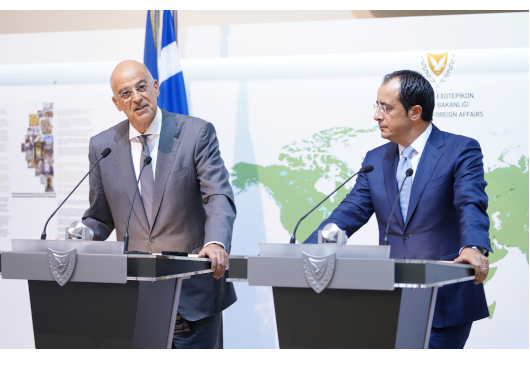 Today, I am very pleased to be visiting Cyprus once again, at a very critical time. I had the pleasure and honour of being received by President Anastasiades and, of course, having a long meeting with my friend Nikos Christodoulides.
Today, I am very pleased to be visiting Cyprus once again, at a very critical time. I had the pleasure and honour of being received by President Anastasiades and, of course, having a long meeting with my friend Nikos Christodoulides.
We talked about our bilateral relations and cooperation in the context of the common outlook we maintain and cultivate with the countries of the region who share our values and outlooks.
Cooperation that is widely recognized as contributing to maintaining peace and stability in our region.
The coordination between Athens and Nicosia is ongoing on the political level, on the level of state officials and in the framework of our common initiatives.
Last week, Mr. Christodoulides and I participated in the extraordinary meeting of the EU Foreign Affairs Council.
In the coming days, we will be participating together in the informal Council meeting in Berlin, where we are to discuss the list of sanctions against Turkey – sanctions that the High Representative has an institutional obligation to present to us.
The escalation in Turkey’s aggressiveness is directed against the EU, and this means that the European response must also be escalated.
Turkey’s illegal conduct will also certainly be discussed at the highest level, at the Summit of the 7 EU Mediterranean states (MED 7) in Corsica, and subsequently at the extraordinary meeting of the European Council, in which President Anastasiades and Prime Minister Kyriakos Mitsotakis will participate.
Turkey’s provocations ignore the clear stances of the EU, the U.S. and the states of our region.
They ignore European values, they ignore International Law, they ignore the Law of the Sea.
They constitute an escalation and they constitute unacceptable militarisation.
They are the choice of a troublemaker, betraying the impasse of Turkey’s own choices.
Nikos and I talked about the absolutely condemnable ongoing illegal Turkish activities in the Cypriot EEZ and in regions of the Greek continental shelf.
We repeat: persisting in violations produces no faits accomplis, persisting in violations produces no legal effect. It reconfirms Turkey destabilising role in the region. It reconfirms Turkey's lack of arguments.
It is obvious that neither Greece nor the Republic of Cyprus are the ones creating the escalation.
But that does not mean we are looking on passively.
We are taking and will continue to take initiatives to avert the creation of faits accomplis.
No one is convinced by Turkey’s pretextual calls for dialogue at a time when Turkey is trying to impose faits accomplis, using blackmail and threats.
As this concerns us, I reiterate here in Nicosia that we have always been in favour of dialogue.
But the dialogue can be carried out only under the rules of International Law, the Law of the Sea, and self-evident good neighbourly relations.
As you heard earlier, Mr. Christodoulides and I also discussed the prospects for the resumption of substantial negotiations on the resolution of the Cyprus issue.
Prospects that, unfortunately, are hindered by Turkey’s constant provocations in the maritime zones of the Republic of Cyprus and in Famagusta.
We are well aware of the challenges involved in the Varosha issue, which is critical to progress in resolving the Cyprus issue.
Greece stands ready to participate in the effort to resolve the Cyprus issue, in the framework of the Good Offices of the UN Secretary-General.
Greece is also prepared to respond to an initiative of the Secretary-General for the resumption of the process at the point where it stopped in Crans Montana, at the soonest possible time.
The Cyprus issue is a top national issue and a main concern of Greek foreign policy.
And our compass in the efforts to resolve this issue can be none other than International Law, the UN Resolutions and, of course, the European acquis.
In closing, being here in Nicosia, I cannot but underscore Greece’s undiminished interest in the issue of the Missing Greeks and Cypriots.
I reiterated to Nikos Christodoulides that Greece will continue to support the efforts of the Republic of Cyprus until Turkey, at long last, complies with the Decisions of the European Court of Human Rights.
Thank you very much. Thank you for the hospitality here in Nicosia.
August 18, 2020


